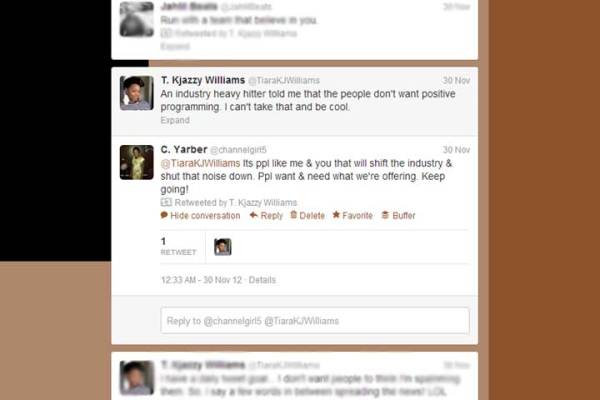
Advice from an industry heavy hitter.
I have a few industry colleagues who feel similar sentiments when it comes to producing and promoting positive media. Having conversations with them lets me know I’m not alone in the struggle. It’s like we’re raging against the machine, storming the fort, taking the Alamo. I mean, I don’t want to paint us as some heroic figures in media coming in on white horses to save the day. Certainly we’re not that self righteous. But we all have a common belief that its time for the landscape of media to change and we’re the ones to do it. Each day we all get up and work toward our goal of changing the piece of the world that is under our influence. Some of us have regular 9 to 5 gigs, others of us would be included in the “freelance” aka “starving artist” category; it’s feast or famine for us. Since launching the campaign to raise money for the online TV network, I’ve been called everything from brave and brilliant to foolish. And sometimes I, like my cohorts, second guess why I’m even doing this. I wonder is it going to work, do people really understand what I’m saying, why don’t I just get what everyone else calls a “real job” and sit down at my desk every day and cash a check on Friday. But that’s not what I’m created to do. And that’s not what my other creative deviants are built for either.
One thing that I must say has bothered me about this entire process is that industry people, the people you expect to get it, really don’t get it. They understand the concept. They think its “noble.” But then they revert to saying how it just won’t work in this dog-eat-dog field. And I respect them for their opines and warnings. I know it comes from a good place because they’re trying to warn me not to set myself up to fail. You see, Hollywood is all smoke and mirrors built on formulaic models that are time tested and proven to turn profits. That’s it. It doesn’t have to be compelling, doesn’t have to inform, barely has to entertain. We’re desensitized to media so much at this point that we passively watch TV and movies because we’re so busy on social media. Our attention spans are divided so much that they can feed us fluff while they eat off the ratings before we can post a status about it on Facebook. A colleague of mine, Kyra Kyles (who by the way has an awesome webseries you should check out) posted a status on Facebook today that just about summed it up:
Y’all playing with me now, right? Joseline, Steebie J, Honey Boo Boo, NeNe and ‘nem can stay on the air, but there is a real-life petition begging people to renew the fantastic, insightful “Save My Son” with Steve Perry? It’s not a no-brainer to keep a show that is saving young Black men from the streets? Maybe it wouldn’t be so bad if the Mayans were right…
The great thing about the digital shift though is that it doesn’t take us to be blockbuster hits or prime-time prizes to turn a profit and create compelling, entertaining and informative content. Not to mention our hearts are in it. This is what we would do for free, most of us are doing it for free until we can turn a profit. Check out the following TV and film producers on the rise. They’re doing it. I’m doing it. And it will be done.
Chanelle Yarber (yours truly) – BrightGirl Media Online TV Network
Araia Tesfamariam – Big Araia the Film
Sherhara Downing- The Sherhara Show
Colen Wiley – Heygood Images
Charell Star – Startup NYC
Tiara Williams – Reel Righteous Entertainment

